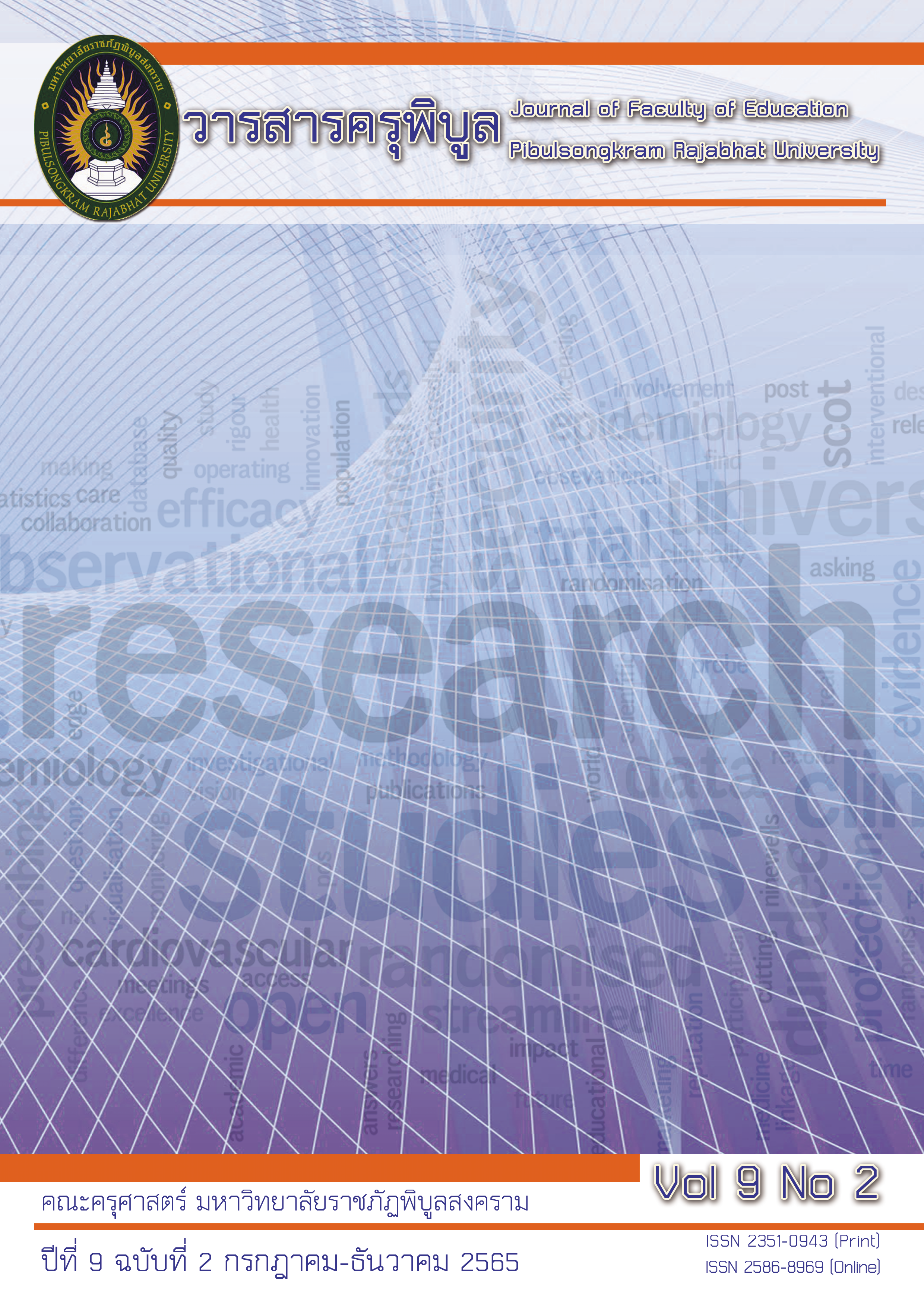THE DEVELOPMENT OF TRAINING COURSES TO ENHANCE TEACHING CAPACITY OF INNOVATION DESIGN FOR TEACHERS OF SCIENCE AND TECHNOLOGY LEARNING SUBJECT GROUPS EDUCATIONAL INNOVATION AREA IN THE EASTERN REGION
การพัฒนาหลักสูตรฝึกอบรมเพื่อเสริมสร้างสมรรถนะการสอนการออกแบบนวัตกรรม สำหรับครูกลุ่มสาระการเรียนรู้วิทยาศาสตร์และเทคโนโลยี พื้นที่นวัตกรรมการศึกษาภาคตะวันออก
Keywords:
Teaching Competency, Innovative Design, Educational Innovation AreAbstract
The objective of this study was 1) to Develop a training curriculum for enhancing innovation design teaching competency 2) to Experimental use of a training curriculum for enhancing innovation design teaching competency and 3) to Evaluate a training curriculum for enhancing innovation design teaching competency Their were 4 phases of research methodology, namely, Phase 1, the study of background information and needs, Phase 2, development of the training curriculum, Phase 3, the trial of the training curriculum, and Phase 4, the evaluation and improvement of the training curriculum. The sample group used in the research was 30 teachers under the Office of Secondary Education Service Area, Chon Buri, Rayong, obtained by systematic random sampling. The research plan was a single-group experiment. Test before and after training the research tools were questionnaires, training courses, Event plan knowledge tests the practical skills assessment form, the attitude assessment form, and the satisfaction assessment form The statistics used in data analysis were percentage, mean (M), standard deviation (S), and t-test.
The results of this research were followed.
1. The results of the expert evaluation found that the training program for enhancing competency in teaching innovation design is appropriate at a high level the mean was 4.48 and the efficiency was 85.22/83.95, higher than the criteria set at 80/80.
2. The results of the experimental training curriculum for enhancing teaching capacity for innovation design showed that teachers had higher scores on knowledge after the training than before the training with statistical significance at the .01 level. The overall score was at a very good level (M = 10.08, S = 0.73) and teachers' attitudes after the training were higher than before. Statistically significant at the .01 level
3. The results of the evaluation of training courses to enhance teaching competency in innovative design found that teachers were satisfied with the training courses. Overall, it was at the highest level (M = 4.97, S = 0.05)
References
กฤติน พันธุ์เสนา และ เผชิญ กิจระการ. (2564). โมเดลการฝึกอบรมแบบผสมผสาน เพื่อเสริมสร้างสมรรถนะด้านเทคโนโลยีสารสนเทศและการสื่อสาร สำหรับผู้อำนวยการสถานศึกษาขั้นพื้นฐาน. วารสารมนุษยศาสตร์และสังคมศาสตร์ มหาวิทยาลัยนครพนม, 11(1), 105-115.
ณัฐกิตติ์ สิริวัฒนาทากุล. (2561). การพัฒนาหลักสูตรฝึกอบรมเสริมสร้างความสามารถการจัดการเรียนรู้สำหรับครูภาษาไทยระดับประถมศึกษาเพื่อยกระดับผลสัมฤทธิ์ทางการอ่านและเขียนภาษาไทยของนักเรียนโดยการจัดกิจกรรมการเรียนรู้โดยใช้สมองเป็นฐานร่วมกับชุมชนการเรียนรู้ทางวิชาชีพ. วารสารศิลปากรศึกษาศาสตร์วิจัย, 10(2), 19-34.
พิเจตส์ ประยุทธสิทธุ์ และคณะ. (2563). การพัฒนาหลักสูตรฝึกอบรมเพื่อพัฒนาทักษะด้านเทคโนโลยีสารสนเทศและการสื่อสารของครูโรงเรียนมัธยมศึกษา สังกัดสำนักงานเขตพื้นที่การศึกษามัธยมศึกษา เขต 11. วารสารบัณฑิตวิทยาลัย พิชญทรรศ์, 15(1), 121-130.
วัชรภัทร เตชะวัฒนศิริดำรง และ ภัทราวรรณ จันทร์เนตร์. (2564). การพัฒนาหลักสูตรฝึกอบรมความรู้เกี่ยวกับการพัฒนาหลักสูตรฐานสมรรถนะสำหรับครูปฐมวัย สังกัดสำนักงานเขตพื้นที่การศึกษาประถมศึกษาพระนครศรีอยุธยา เขต 1. วารสารวิจัยมหาวิทยาลัยราชภัฏหมู่บ้านจอมบึง สาขามนุศาสตร์และสังคมศาสตร์, 9(2), 103-121.
ศิริพร สุวรรณรังษี. (2564). การพัฒนาหลักสูตรเสริมสร้างสมรรถนะครู ด้านทักษะการคิดเชิงสร้างสรรค์สำหรับนักศึกษาวิชาชีพครู สาขาการศึกษาปฐมวัย วิทยาลัยนครราชสีมา. วารสารครุศาสตร์อุตสาหกรรม. 20(1), 72-81.
สาวิตตรี สิทธิชัยกานต์ และคณะ. (2560). การพัฒนาหลักสูตรฝึกอบรมเสริมสร้างความสามารถในการจัดการเรียนรู้บูรณาการธรรมชาติวิทยาศาสตร์ สำหรับครูระดับมัธยมศึกษา. วารสารสาขามนุษยศาสตร์ สังคมศาสตร์ และศิลปะ, 10(2), 1076-1088.
สำนักงานเขตพื้นที่การศึกษามัธยมศึกษาชลบุรี ระยอง. (2564). งานข้อมูลสารสนเทศ กลุ่มนโยบายและแผนสารสนเทศทางการศึกษา ปการศึกษา 2564. ระยอง: สำนักงานเขตพื้นที่การศึกษามัธยมศึกษาชลบุรี ระยอง.
สำนักงานคณะกรรมการการศึกษาขั้นพื้นฐาน กระทรวงศึกษาธิการ. (2560). ตัวชี้วัดและสาระการเรียนรูแกนกลาง กลุ่มสาระการเรียนรูวิทยาศาสตร์และเทคโนโลยี (ฉบับปรับปรุง 2560). กรุงเทพฯ: โรงพิมพ์ชุมนุมสหกรณ์การเกษตรแห่งประเทศไทยจำกัด.
สุพรรณี ชาญประเสริฐ. (2556). การจัดการเรียนรูวิทยาศาสตร์และทักษะที่จำเป็นในศตวรรษที่ 21. วารสารสถาบันส่งเสริมการสอนวิทยาศาสตร์และเทคโนโลยี (สสวท.), 42(185), 10-13.
อภิชาต เนินพรหม. (2563). การพัฒนาหลักสูตรฝึกอบรมเสริมสร้างความสามารถในการใช้เทคโนโลยีดิจิทัลเพื่อกามรวัดและประเมินผลการเรียนรู้ตามสภาพจริงสำหรับครูผู้สอนอาชีวศึกษา. วารสารวิชาการสถาบันการอาชีวศึกษาภาคใต้, 5(2), 80-91.
อิสระ ชอนบุรี และคณะ. (2563). การพัฒนาหลักสูตรฝึกอบรมภาวะผู้นำทางวิชาการของครูในโรงเรียนสังกัดสำนักงานเขตพื้นที่การศึกษาประถมศึกษานครพนม เขต 2. วารสารบัณฑิตศึกษา, 18(80), 80-89.
Luepong, P. (2012). The Competency Development of Human Resources. Executive Journal, 32, 103-108.
McCombs, M. E., & Becker, L. B. (1979). Using mass communication theory. Englewood Cliff, New Jersey: Prentice Hall.
Oliva, P. F. (2005). Developing the Curriculum. (6thed.). New York: Harper Collins.
Saylor, J. G., Alexander, W.M., & Lewis, A.J. (1981). Curriculum Planning for Better Teaching and Learning. (4thed.). New York: Holt, Rinehart & Winton.
Schwab, K. (2019). The Global Competitiveness Report 2019. Switzerland: World Economic Forum.
Taba, H. (1974). Curriculum Development: Theory and Practice. (4th ed.). New York: Harcourt, Brace & World.
Tyler, R. W. (1974). Basic Principles of Curriculum and Instruction. Chicago: The University of Chicago Press.
Downloads
Published
Issue
Section
License
Copyright (c) 2022 คณะครุศาสตร์ มหาวิทยาลัยราชภัฏพิบูลสงคราม

This work is licensed under a Creative Commons Attribution-NonCommercial-NoDerivatives 4.0 International License.
ลิขสิทธิ์เป็นของคณะครุศาสตร์ มหาวิทยาลัยราชภัฏพิบูลสงคราม


